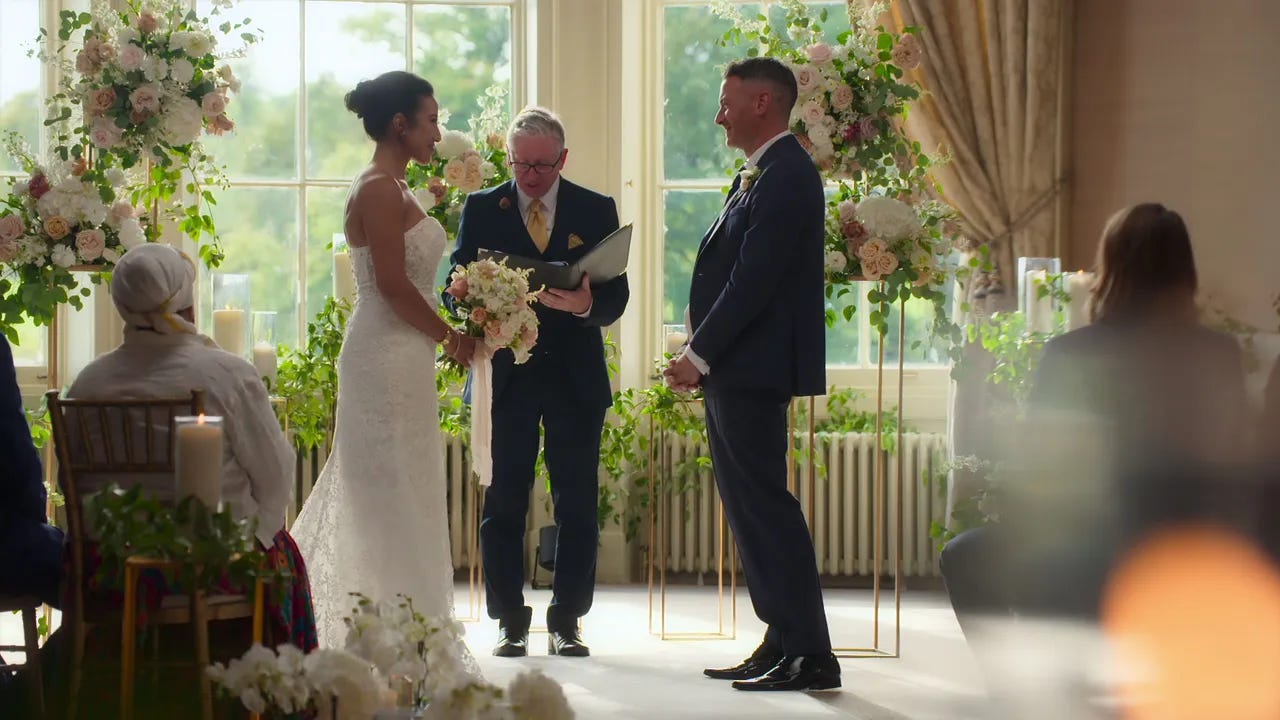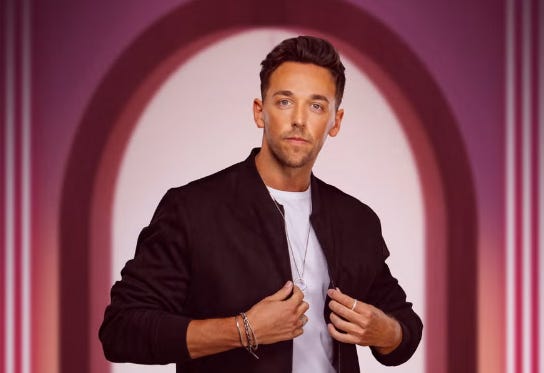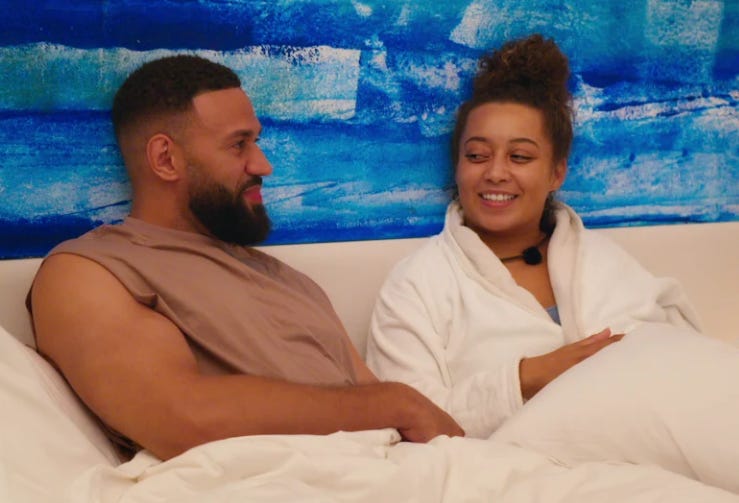

Discover more from As I Was Saying with Poorna Bell
Three things to take away from Love Is Blind UK around dating and relationships
Even if you don't watch the show, there are some epic learnings - contains spoilers
Credit: Netflix (Maria and Tom)
I don’t watch a lot of reality TV but Love Is Blind is one of the few exceptions. Although US version became absolutely dire in the last two seasons, the first season of the UK version currently showing is the best one of them all - characters with nuance, a genuine desire for connection and the showcasing of friendship.
For anyone unfamiliar with the construct – the idea is that men and women date sight unseen for a few days. Then they decide whether or not to propose and then after accepting a proposal, they see each other in person, spend some time on honeymoon, co-existing as a group with the other engaged folk, and then decide whether to legally tie the knot mere weeks later. It sounds ridiculous, and often is. However.
Although reality dating is not equivalent to dating in the real world, there are some aspects that ring true, such as most people in the Love Is Blind universe come to it because they’ve been jaded by dating apps. Or because they keep being led by their superficiality and choose the wrong people, and hope that this concept will break their habit. (It doesn’t, and is almost always a teachable moment of how some people need therapy).
Paid subscribers not only keep this newsletter going but also receive access to the full archive and access to chats - if you’d liked to consider an upgrade please do and you’ll have my eternal gratitude!
There are situations and life lessons that come up during the show, which I feel are universal, particularly judging by the reaction online to them. Here’s my takeaways:
Financial incompatibility is a valid deal-breaker
For anyone who doesn’t watch the show: Tom and Maria were one of the couples who made it to the altar, and at the final moment, Tom said no to marrying her. In the clips afterwards, he cited their incompatibility around money and gender roles. Maria, who comes from a British Moroccan family had certain expectations such as the man paying for things in the first few months of dating, and said that when she had children she’d expect the man to work while she looked after the children.
Tom said that he would prefer if his partner worked, and in the closing episode, said that if he had children, he wouldn’t want his daughter to grow up expecting a man to pay for everything and to be independent. Tom isn’t a likeable character, particularly when it was revealed that he had judged Maria before meeting her because she worked as a make-up artist. However, the scouring this man got after voicing his concerns around their financial incompatibility was unfair.
My view is that any woman who is able, should seek financial independence where possible, or financial parity so that she is not dependent on a man. The most important reason is to give her options and the ability to exit the relationship if she needs to. Perhaps there are situations in which a woman depends financially on a man and her decisions are wholly her own, but I am not sure how this occur given that money is transactional, whether it is buying labour in the home, goods or a person’s decision-making power.
Having said all of that, it is also completely valid for someone to not want to choose that path, I know a number of people whose marriages seem healthy and have worked out fine. But – and this is a big but – only when both parties want the same thing. Financial incompatibility is one of the most damaging things in a relationship because the destruction caused by it doesn’t happen overnight, it takes place over years.
And not just incompatibility, but honesty. My late husband accrued thousands and thousands of pounds of debt, concealed most of it from me and and laughed it off whenever I’d ask to see his bank statements. Being married is no joke, particularly given the legal ramifications of your financial fate being entwined with theirs, and so my advice to anyone before getting married is to have those awkward, cringey conversations because the consequences are serious.
Me, me, me
Credit: Netflix/Johan Paulin (Sam from London)
I’m going to phrase this kindly because reality shows are heavily edited and follow story arcs that create villains and heroes, and much has been said of the toll online criticism can have upon a person. The villain of Love Is Blind season one is a man named Sam aka ‘Sam from London’, who initially proposed to Nicole, and Nicole then broke it off with him shortly after they met because she didn’t feel things were right.
Sam from London had a lot going on – he was accused of being on there to seek fame by other men in the show, he was disrespectful about Nicole behind her back, and there was an air of insincerity whenever he’d try and say something romantic. A common thread of feedback from women was that he was telling them what they wanted to hear.
All of that aside, the biggest red flag was Sam’s one-sidedness when it came to considering his partner. Most of what we were shown was framed within his needs, and what he wanted, and how he deserved to meet someone, and how it never seemed to work out for him. In most of what we saw, none of it was about the other person – they were simply a means to get what he wanted: validation from being wanted and being loved. We all want validation, and we all want love – but most of us should hopefully know that both these things as a consequence of loving the person we have chosen – we don’t choose a person simply based on what we think they can give us.
There were tones of it when Maria was let down at the altar by Tom. Whether it was crafty editing or not, her disappointment was framed in the lens of not having the wedding she wanted, of it not being her story, rather than the prospect of not having Tom in her life. It boggles the mind that people don’t understand that another person is not the centre of their universe. That they too have a centre, and we have to ask them what their needs are, and what they need to feel loved, in order to spin together on the same axis.
Understanding that the end of something is hard, but it is life’s best teacher
Credit: Netflix (Demi and Ollie)
Demi and Ollie were a couple who didn’t make it to the altar and while the reasons for that are unclear, anyone familiar with the Love Is Blind format can tell that something happened, that hasn’t been broadcast yet. Ollie couldn’t look at Demi in the eyes, and Demi made a beautiful speech about why she was saying no, saying that through this process she had learned to love and accept herself.
Whatever comes out from the reunion, watching Demi’s transformation as someone who knows how she wants to be loved, is quite literally priceless for her. There is no amount of money that can teach that learning. And it’s a worthwhile lesson to remember when you are in the fire of a heartbreak – that whatever happens, you are a better, more learned person as a result.
If you’ve been watching the show - what are your thoughts?

















Loved this Poorna. I do not know Demi, I have never met her and probably never will. But when she made that speech at the altar I clutched my heart like she was my own daughter. Sometimes the success of a relationship is in the way it’s taught you how gorgeous, smart and powerful you are and how you deserve to be treated. I felt like she went from thinking she was lucky to have Ollie to realising that actually *he* was the one who was punching above his weight. Can’t wait for the reunion, especially if there’s hidden juice….Becks X
Loved this piece, Poorna! I have been watching avidly. It’s been much better than the US ones I thought.